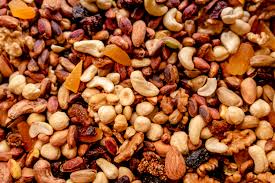As finals approach, students often focus on reviewing notes, staying up late and squeezing in last-minute study sessions. However, one essential element of academic success is often overlooked: nutrition.
During high-stress academic periods like final exams, the brain is working overtime. To maintain focus, mental clarity and energy, students need to fuel their bodies — especially their brains — with the right nutrients. What you eat directly impacts your ability to concentrate, retain information and stay energized through long study sessions and exam days, according to WebMD.
The best foods for brain function are those that release energy slowly and contain a balance of nutrients. Whole grains, lean proteins, fruits, vegetables and healthy fats support memory and cognitive performance, according to a Harvard Medical School study. In contrast, processed snacks high in sugar and refined carbohydrates may lead to a quick burst of energy followed by a crash in focus and alertness.
Choosing healthy snacks can make a crucial difference when studying. Easy options like apple slices with peanut butter, mixed nuts, Greek yogurt with berries or whole-grain crackers with hummus provide lasting energy and key nutrients. These snacks help stabilize blood sugar levels and keep the brain running smoothly during long hours of focus, according to the Brain Food Snack Guide.
Equally important are full meals that include a balance of carbohydrates, proteins and fats. A breakfast of scrambled eggs with whole-grain toast and fruit can help kick-start the day. For lunch or dinner, meals like a turkey sandwich with spinach and avocado or a grain bowl with rice, vegetables and grilled chicken offer both fuel and nutrition.
Staying hydrated is also essential. Dehydration can lead to fatigue, headaches and decreased concentration, according to Central Oregon Pediatrics Associates. Water is the best choice, but herbal teas or low-sugar drinks can also help students stay alert and refreshed.
Eating well during finals is not about dieting or cutting out all snacks — it is about making smart choices that support brain health and academic performance. A steady supply of nutritious food and water can improve focus, energy and even mood, making study sessions more productive and exam days a little less stressful.
Here are a few recipes from the Falconer to help you get started:
Energy-boosting breakfast: Peanut Butter Banana Oatmeal
Ingredients
- ½ cup rolled oats
- 1 cup milk or non-dairy milk
- 1 tbsp peanut butter
- ½ banana, sliced (or other fruit of choice)
- Dash of cinnamon (optional)
Directions
Cook oats and milk in a pot over medium heat, stirring frequently until thickened (about 5 minutes). Remove from heat, stir in peanut butter and top with banana slices and cinnamon. This warm breakfast delivers lasting energy and brain-friendly nutrients.
Healthy snack: DIY Trail Mix
Ingredients
- ¼ cup almonds
- ¼ cup walnuts
- 2 tbsp dark chocolate chips
- 2 tbsp dried cranberries or raisins
- 2 tbsp sunflower seeds
Directions
Mix all ingredients in a reusable container or bag. Store in a cool place and take it on the go for a crunchy, energy-boosting snack packed with healthy fats and antioxidants.
Nutritious dinner: Chicken Quinoa Bowl
Ingredients
- ½ cup cooked quinoa
- ½ cup grilled or baked chicken breast, chopped
- ¼ cup roasted sweet potatoes
- ¼ cup steamed broccoli
- Drizzle of olive oil or lemon
Directions
Assemble all ingredients in a bowl. Drizzle with olive oil or dressing. This balanced meal includes lean protein, fiber and slow-burning carbs to help refuel after a long study day.
These recipes are simple to prepare, affordable and designed to keep you focused and energized when it matters most.
Good luck on finals — and don’t forget to feed your brain!











